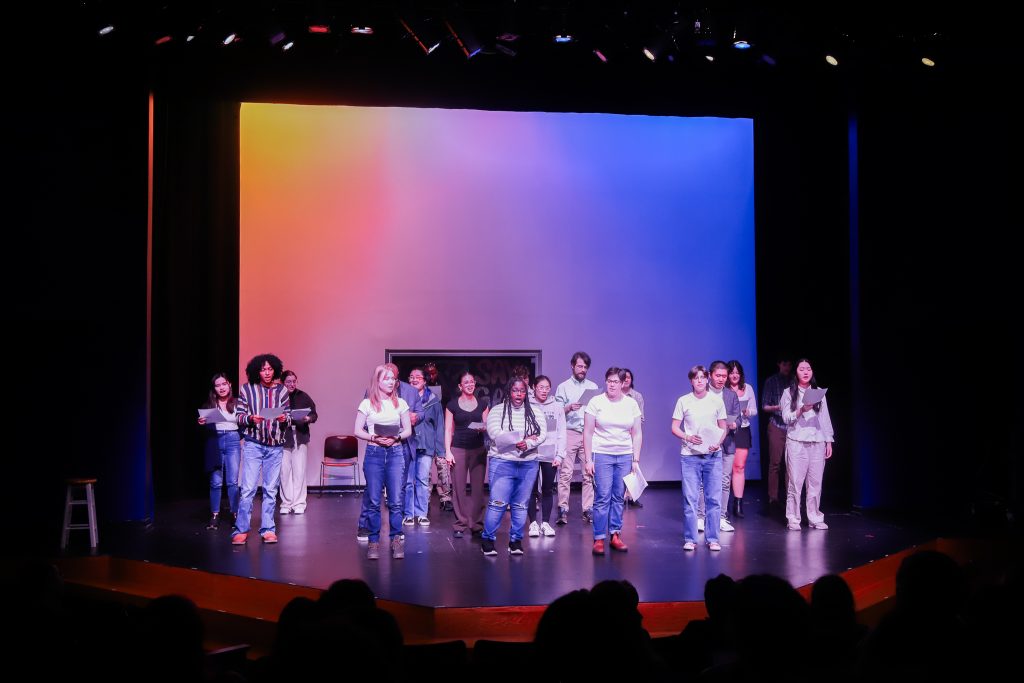Binghamton University recently hosted a series of play readings in collaboration with the organization Say Gay Plays, followed by a talk from the pioneering Iranian LGBTQ+ activist and current resident practitioner at the Institute for Genocide and Mass Atrocity Prevention, Shadi Amin.
The short readings, performed in part by students, were provided by Say Gay Plays, an organization that provides royalty-free plays by queer playwrights to not-for-profits like the University.
The organization was formed in response to a Florida state law, also known as “Don’t Say Gay,” which prohibited classroom instruction on sexual orientation and gender identity from kindergarten to third grade. They hope theater activism will give communities tools to combat anti-LGBTQ+ rhetoric and laws, all the while raising money for local queer-focused organizations.
David Bisaha, director of the play “The Greenhouse” and an associate professor of theatre, wrote about the damage that such laws create and how theatrical programs can combat hate.
“Where theatre can contribute is in telling relatable human stories, in making audiences understand in a different kind of way than what we see on social media or hear in political speeches,” Bisaha wrote in an email. “I think that, for most people, listening and knowing the other is a bridge to understanding. And, while it’s hard sometimes, understanding (even while disagreeing on some political issues) is necessary for a functioning society.”
Six plays were read and performed throughout the night and donations were collected for the Southern Tier AIDS Program/Identity Youth Center. These included “Happy Endings for People Like Us,” “i love the shit out of you,” “Principal’s Office,” “An Address to the Florida Legislature” and “question (ˈkwɛs.tʃən) vb., the imperative form.”
One of the highlights was “An Address to the Florida Legislature.” The sole character was John Q. Public, a man who is addressing the Florida legislature about various things that must be added to the Don’t Say Gay law to prevent queerness from being promoted to young people.
His suggestions included banning children’s books written by queer people like the “Frog and Toad” and “Harriet the Spy” series and films with queer subtext and appeal like “Legally Blonde” and “Grease.”
It would be easy for a one-man play about homophobia to depress an audience, but the crowd was enraptured by the charisma of the only actor, Ansa Akyea, a senior lecturer of theatre said. Every time he said a book or film or some other thing that should be banned, a substantial segment of the audience loudly gasped and chuckled at the preposterousness of the ideas.
Akyea played the ugly outrageousness of a fired-up politician without relying on pure menace and thus created an easy character to laugh at without feeling dejected. Indeed, if a real politician came to a podium and demanded that we had to clean up homosexual-filled professions like florists and flight attendants, it would’ve been much harder to laugh along with him.
After a short break, Elizabeth Mozer, an associate professor of theatre, introduced Amin. In her talk, she discussed their life growing up in Iran as a girl who could play soccer and liked other girls and their later political exile.
While she was only a child during the Iranian Revolution, Amin was nonetheless opposed to it after her mother, who was against the intermingling of religion and government, said, “When they come [to] power, we will lose our freedom as women.” After being arrested for hanging out flyers opposing the government, Amin took a circuitous route out of Iran that ended with her claiming political asylum in Germany. It was there that she began to be even more involved with humans, women and specifically, LGBTQ+ rights.
Amin sees the work of Say Gay Plays as deeply connected to their work at I-GMAP and believes that the arts, including theatre, have a great role in society.
“I feel these art forms deeply, whether it’s ‘Bella Ciao’ in Italian, a painting by Frida Kahlo, the German film ‘[Aimee] and Jaguar,’ or a dance performance by an Iranian artist,” Amin wrote in an email. “I connect with them, even without fully knowing their history or language. Art and culture have the power to bring people together; it’s as if all your senses are engaged, allowing you to analyze and appreciate on multiple levels.”



